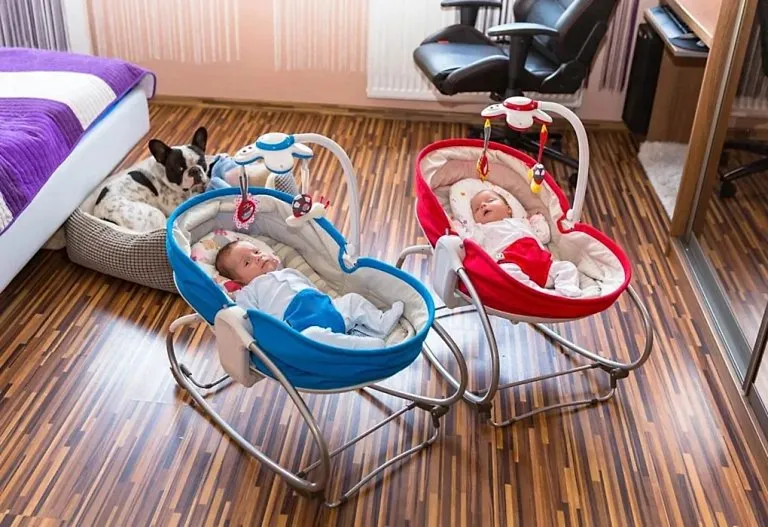Newborn Baby Sleeping Too Much – Do I Need to Worry?

Babies are such angelic beings, radiating some serious pick-me-up and cuddle-me vibes until they start screaming. Then it is a frantic run to feed, change diapers and do whatever it takes to calm them down. And that is how most of us expect babies to be! However, there are times when your baby is really calm and prefers sleeping to feeding, and it makes you a bit anxious. You may think, ‘Why is my baby sleeping a lot?’ ‘Is there anything wrong with my sleepy newborn napping too much?’ These questions are justified as a parent. Read on to find out if a newborn sleeping too much should be a cause for worry or if your baby is just a good sleeper.
How Much Sleep Should a Newborn Baby Get in a Day?
Newborns do sleep a lot, and it is something they did for most of the time back in the womb. Back then, they were surrounded by the sounds of the mother’s heartbeat, digestive system and voice. In such sleep-inducing conditions, they hit the snooze mode 90%-95% of the day. But what outside? How long do babies sleep?
According to the National Sleep Foundation, once outside of the womb, newborns continue to sleep for 14 to 18 hours a day, waking up every two to three hours for a feed or diaper change (1). The American Academy of Pediatrics says that older infants of 4 to 12 months of age need about 12 to 16 hours of sleep a day. As babies reach toddlerhood, the sleep requirement reduces to 11 to 14 hours a day (2). The hours of sleep can vary slightly since each baby is unique and has different needs. Newborns sleep a lot because their bodies are rapidly growing, and sleep is essential for their proper mental and physical development, especially the development of the brain and central nervous system. Therefore, it is safe to say that newborns spend around 80%-85% of the day sleeping, and there are no hard and fast rules as to the number of hours a baby needs to sleep as long as they are healthy and fed regularly.
Can Your Infant Sleep Too Much?
A baby sleeping all day can be a blessing and a curse. On the one hand, it gives you the time you need to catch up on some rest. However, it can also be a source of anxiety. ‘Is my baby sleeping more than usual?’ is one question that may ring through your mind. The truth is that it depends on the individual needs of the baby. Some might sleep more while others sleep less, and it is all right as long as they remain healthy. One way to ascertain if the baby is feeding enough is to check their diapers. Their urine shouldn’t be too yellow (darker yellow is a sign that the baby isn’t feeding enough), and there should be an adequate number of stools of the proper colour. An unusually sleepy baby will be cranky and clingy. A baby who does not have these issues might make parents antsy by sleeping too contently (welcome to the world of parenting). It is not a problem unless sleeping impacts their feeding and health. The number of hours your baby spends sleeping gradually decreases as they grow older. This is good because you do not want a baby that sleeps too much that he/she does not learn to sit up or crawl around.
Why Do Babies Sleep Too Much?
Does your newborn sleep all day and up at night? Well, your baby sleeping too much in their infancy actually benefits them. How, you may ask. During the first weeks of life, all babies do is eat, sleep, poop, and repeat. But all that snoozing is actually giving your baby’s brain enough energy to develop at an incredible speed.
Babies grow at lightning speed in the very first year of their life, and by 3-4 months, babies double their weight. Similarly, by 12 months of age, babies have tripled their birth weight and learn to roll, creep, crawl, coo, make sounds, eat solids and learn social skills. Sleep is an important factor behind all these milestones. Sleep promotes brain development, sensory processing, energy restoration, memory consolidation, encoding, and learning, and much more (3). Sound sleep helps babies engage with their environment in a calm manner and learn on a rapid scale. In short, newborns sleep so much because they’re learning so much and growing so quickly. All that rest helps fuel the big changes they’re going through.
When You Need to Be Concerned
If you find that the baby is sleeping all day without getting up in between feeds, it is necessary to stimulate the baby to wake up. Also, if there is a sudden increase in the number of hours spent sleeping, you might want to look into it for any health issues. But keep in mind that growth spurts in babies can also make them sleepier than usual. By the time the baby is two months old, he/she is likely to sleep longer during the night and stay awake longer during the daytime. This enables them to learn skills such as sitting up and gradually more complex tasks such as walking and speaking. So, if your three-month-old baby is sleeping too much and is hardly up, you might want to consult a paediatrician.
What to Do If Your Baby Is Sleeping More Than Usual
If your maternal instincts tell you that the baby is sleeping more than what is required, a consultation with the baby’s paediatrician would be the best thing to do. Check-up on the baby’s health since jaundice and other infections can make the baby tired and sleep more. Medical procedures such as circumcision can also make the baby sleepier than usual. No matter what, make sure that you get to feed your baby. Do this even if you have to wake them up.
When to Wake Up Your Sleepy Baby for Feeding
Newborns initially lose their birth weight but gain it back within the first week and then continue to gain weight at a healthy pace. But if the baby is lacking in the weight gain department, it indicates that they are not feeding enough, and hence, your doctor might suggest that the baby is woken up at intervals every 3 to 4 hours and fed (4). Generally, experts at the American Academy of Pediatrics suggest that babies should not go longer than about 2 to 3 hours during the day or four hours at night without feeding (5). However, it will be a few weeks before the paediatrician has enough data to ensure the weight gain is optimum. Until then, you will have to rely on your gut feeling to wake the baby up and feed him/her after a couple of hours.
How to Wake Up Your Infant for Feeding
It’s never a good idea to wake someone up abruptly, even if it is your calm sleeping baby, they might end being cranky and non-cooperative. If you find your 3-month baby sleeping too much, here are some smooth tricks to gently wake them up:
1. Unswaddle the Baby
Sometimes a little less warmth is all that is required to get a sleeping baby to wake up. Babies are usually put to bed all swaddled up and cosy, so when it is time for them to wake up try taking off their blanket and loosening their clothing. The exposure to cool air and the physical stimulation of being undressed will bring them to open their eyes.
2. Change Their Diapers
A slight disturbance in their sleeping position or a light freshening up can help to wake the baby. Hence, changing diapers or wiping their bum can wake them up.
3. Stroke the Baby’s Back
Running your fingers along their back while feeding will keep them from falling asleep before they are full. They tend to fall asleep while feeding due to the extra cosy effect created by the warmth of the mother’s presence and embrace.
4. Place the Baby on a Firmer Surface
Remove them from their cradle and keep them on a firmer surface, such as a play mat. This can make them feel more vulnerable and hence wake them up.
5. Pick up the Baby
Gently pick up the baby and stroke the baby’s cheeks and foot. This slight disturbance will likely stimulate them to wake up.
6. Blow in Baby’s Face
Try blowing gently on the baby’s face; the flow of air will awaken the baby (but be prepared to get a weird look from your baby!).
7. Give the Baby a Bath
This is a more drastic measure; wiping the baby’s body with a wet, warm washcloth will definitely perk up the little sleepyhead.
FAQs
1. What signs suggest that your baby is sleeping too much and needs to be woken up?
Not having wet or soiled diapers, having trouble latching on to the nipple, looking lethargic and tired, experiencing growth spurts, ill with cough, and, of course, sleeping for more hours time than usual are some signs indicating that the baby is sleeping too much and should be woken up. If the condition persists or you have doubts, don’t hesitate in consulting your paediatrician.
2. Is it okay to let newborns sleep all day?
Although newborns signal on their own about their hunger, sometimes, they could sleeping at a stretch, which my feel like they are sleeping all day without feeding much. It is wise to wake up your infant every 2 to 4 hours to feed her with necessary nutrition and also avoid dehydration (6).
3. What will happen if I let my baby sleep too much?
If you let your newborn baby sleep too much during daytime naps, they might have problems with their nighttime naps, which may disturb their as well as your circadian rhythm.
Sleeping patterns vary from one baby to another, just as their personalities. Therefore, a baby sleeping more need not necessarily ring bells of alarm unless it affects their health. Parenting is a learning curve, you learn and unlearn as your baby grows up and you get tuned in to the baby’s requirements. Something that helps a lot is your maternal instinct, which tells you if something is affecting the baby. So if your newborn is a sweet little being who loves to sleep, you might as well enjoy the calm while it lasts.
References/Resources:
1. How Much Sleep Do You Really Need?; National Sleep Foundation; https://www.thensf.org/how-many-hours-of-sleep-do-you-really-need/
2. Healthy Sleep Habits: How Many Hours Does Your Child Need?; American Academy of Pediatrics; https://www.healthychildren.org/English/healthy-living/sleep/Pages/healthy-sleep-habits-how-many-hours-does-your-child-need.aspx
3. Altimier. L, et al.; The Neonatal Integrative Developmental Care Model: Advanced Clinical Applications of the Seven Core Measures for Neuroprotective Family-centered Developmental Care; Newborn and Infant Nursing Reviews, Volume 16, Issue 4; https://www.sciencedirect.com/science/article/pii/S1527336916301118; December 2016
4. Sleep and Your Newborn; Nemours KidsHealth; https://kidshealth.org/en/parents/sleepnewborn.html
5. How Often To Breastfeed; American Academy of Pediatrics; https://www.healthychildren.org/English/ages-stages/baby/breastfeeding/Pages/How-Often-to-Breastfeed.aspx
6. Should I wake my newborn for feedings?; Mayo Clinic; https://www.mayoclinic.org/healthy-lifestyle/infant-and-toddler-health/expert-answers/newborn/faq-20057752
Also Read:
Baby Sleeping on Side
Baby Sleep Problems
Basics of Newborn Baby Sleep (0 to 3 Months)
Baby Sleeping Position – What Is Safe?
Was This Article Helpful?
Parenting is a huge responsibility, for you as a caregiver, but also for us as a parenting content platform. We understand that and take our responsibility of creating credible content seriously. FirstCry Parenting articles are written and published only after extensive research using factually sound references to deliver quality content that is accurate, validated by experts, and completely reliable. To understand how we go about creating content that is credible, read our editorial policy here.






















.svg)


















